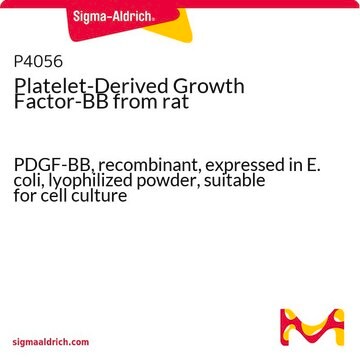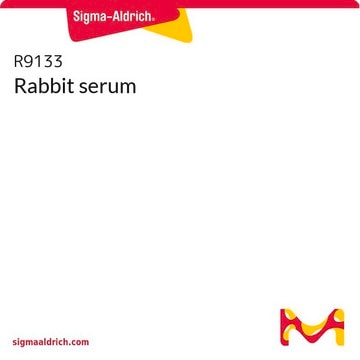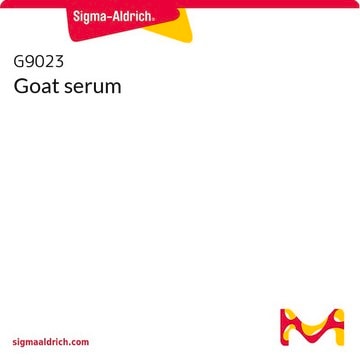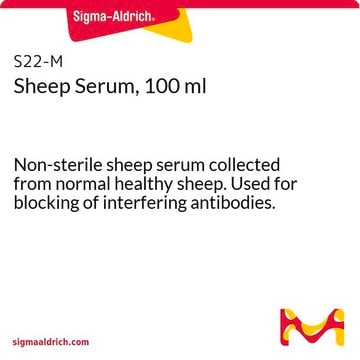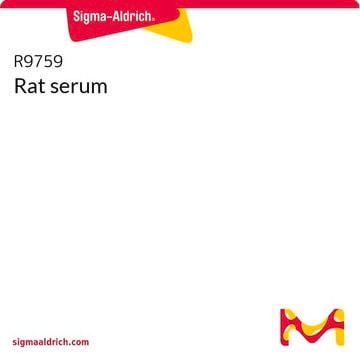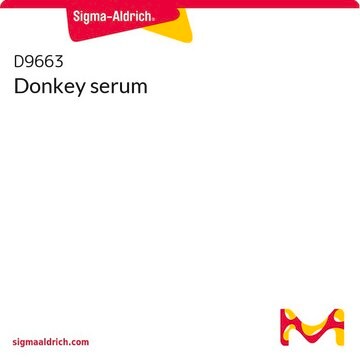Recommended Products
biological source
sheep
Quality Level
conjugate
unconjugated
sterility
non-sterile
contains
preservative
shipped in
dry ice
storage temp.
−20°C
General description
Sheep Serum is a pooled preparation obtained from a normal donor herd.
Application
Sheep serum can be used as a blocking agent and control in immunoassays. It has also been used to block non-specific reactivity in immunohistochemistry of frozen rat levator labii superioris muscle tissue sections.
Sheep serum has been used as a blocking agent and control in immunoassays.
Disclaimer
Unless otherwise stated in our catalog or other company documentation accompanying the product(s), our products are intended for research use only and are not to be used for any other purpose, which includes but is not limited to, unauthorized commercial uses, in vitro diagnostic uses, ex vivo or in vivo therapeutic uses or any type of consumption or application to humans or animals.
Signal Word
Warning
Hazard Statements
Precautionary Statements
Hazard Classifications
Aquatic Chronic 2 - Eye Irrit. 2 - Skin Irrit. 2 - Skin Sens. 1
Storage Class Code
12 - Non Combustible Liquids
WGK
WGK 3
Flash Point(F)
Not applicable
Flash Point(C)
Not applicable
Personal Protective Equipment
dust mask type N95 (US), Eyeshields, Gloves
Certificates of Analysis (COA)
Search for Certificates of Analysis (COA) by entering the products Lot/Batch Number. Lot and Batch Numbers can be found on a product’s label following the words ‘Lot’ or ‘Batch’.
Already Own This Product?
Find documentation for the products that you have recently purchased in the Document Library.
Customers Also Viewed
Emilia Evgenieva et al.
Neurorehabilitation and neural repair, 22(6), 754-768 (2008-07-10)
Using the rat facial nerve axotomy model, the authors recently showed that manual stimulation of denervated whiskerpad muscles reduced the posttransectional polyinnervation at the neuromuscular junctions and promoted full recovery of vibrissal whisking. Prompted by implications for rehabilitation therapy, the
A S Popratiloff et al.
The Journal of comparative neurology, 433(3), 364-379 (2001-04-12)
Chewing, swallowing, breathing, and vocalization in mammals require precise coordination of tongue movements with concomitant activities of the mimetic muscles. The neuroanatomic basis for this oro-facial coordination is not yet fully understood. After the stereotaxic microinjection of retrograde and anterograde
Stoyan P Pavlov et al.
Experimental neurology, 211(1), 292-300 (2008-04-03)
We have recently shown in rat that daily manual stimulation (MS) of vibrissal muscles promotes recovery of whisking and reduces polyinnervation of muscle fibers following repair of the facial nerve (facial-facial anastomosis, FFA). Here, we examined whether these positive effects
S Kiryakova et al.
Experimental neurology, 222(2), 226-234 (2010-01-14)
Recently, we showed that manual stimulation (MS) of denervated vibrissal muscles enhanced functional recovery following facial nerve cut and suture (FFA) by reducing poly-innervation at the neuro-muscular junctions (NMJ). Although the cellular correlates of poly-innervation are established, with terminal Schwann
Fadi Sader et al.
Scientific reports, 9(1), 1144-1144 (2019-02-06)
Axolotls have the amazing ability to regenerate. When compared to humans, axolotls display a very fast wound closure, no scarring and are capable to replace lost appendages perfectly. Understanding the signaling mechanism leading to this perfect healing is a key
Our team of scientists has experience in all areas of research including Life Science, Material Science, Chemical Synthesis, Chromatography, Analytical and many others.
Contact Technical Service